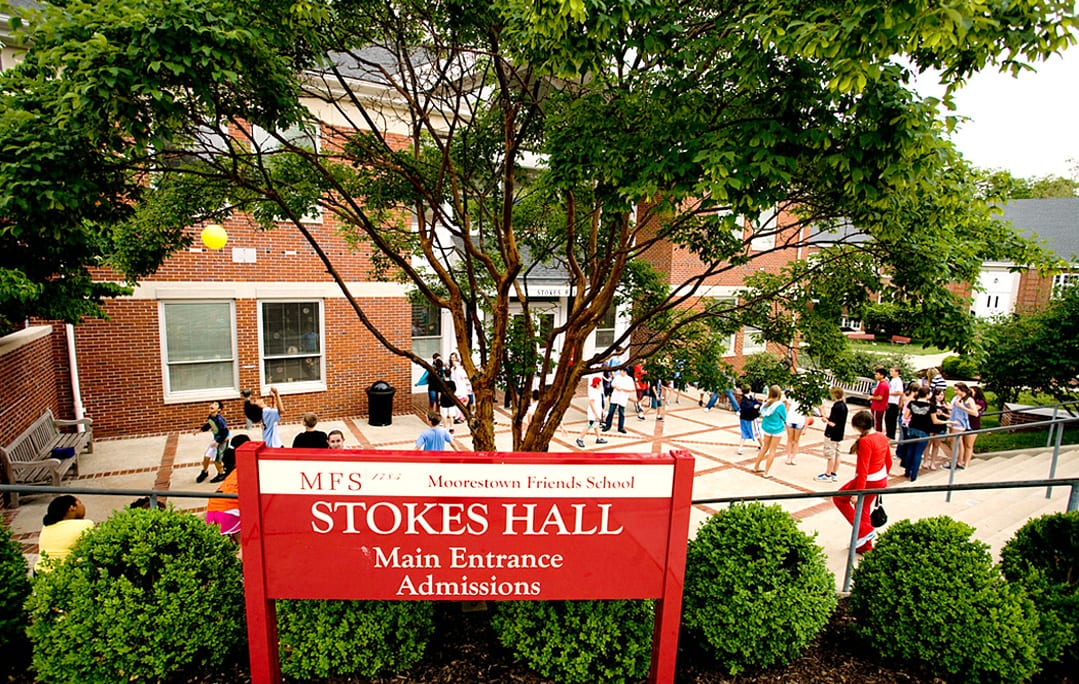The Quaker Decision-Making Process
Written by Melissa McCourt and Dan Zemaitis ’98
 Chester Reagan Chair for Quaker/Religious Studies Melissa McCourt and MS/US Religion/Quaker Studies & History Teacher Dan Zemaitis ’98 are the duo charged with ensuring that MFS’ foundational Quaker values permeate throughout everyday school life. This is one of several Quakerism-themed communications this year to help orient our families to daily life in a Friends school.
Chester Reagan Chair for Quaker/Religious Studies Melissa McCourt and MS/US Religion/Quaker Studies & History Teacher Dan Zemaitis ’98 are the duo charged with ensuring that MFS’ foundational Quaker values permeate throughout everyday school life. This is one of several Quakerism-themed communications this year to help orient our families to daily life in a Friends school.
Conflict. Discernment. Discord. Unity. Quaker decision making is not easy. When we truly engage in community decision making, guided by the Inner Light in ourselves and others, we are bravely participating in a process that is not owned by any individual. We are committing to taking our time, and trusting that an outcome will eventually be revealed. Throughout this process, individuals might feel hopeful, impatient, connected, or even changed by the reflections shared by community members. In an individualist culture, this collectivist approach to decision making pushes against our tendency to expect that we will get an outcome quickly. Quaker decision making is based on the Quaker belief that process is just as important as product, if not more so. It is rooted in the belief that sharing your perspective is both a privilege and a responsibility that one must uphold to the community.
Why We Use Quaker Decision Making at MFS
As a Quaker school, MFS is committed to using Quaker principles in its decision-making processes and fostering leadership skills amongst our students. We believe it is important for our students to understand the relationship between the Quaker values we hold and how those values can translate into real-world situations. To this end, we provide our students with numerous opportunities to utilize the skills they learn inside and outside the classroom to strengthen our community.
Community Decision-Making Skills
When engaging in a range of Quaker decision-making practices, students develop an important set of skills including: the ability to hold the validity of multiple truths at once, empathetic listening to the perspectives of others, being open to changing one’s mind, and making decisions that are guided by a Divine Truth. If the community focuses on developing these skills, “the process” naturally leads to a feeling of meaning and unity.
 Opportunities for Student Leadership and Voice
Opportunities for Student Leadership and Voice
In Friends schools, students learn that they have a voice and that their voice can inform decisions that are made in the classroom and in the wider community. Conflict can arise as individuals learn that there are many voices and many perspectives. What happens when the group disagrees? Part of the process includes learning about viewpoints that might challenge an individual’s core beliefs. While you might often hear of finding consensus or agreement on a topic, we encourage our community to seek unity on decisions that are difficult or at times divisive.
Some examples of how Quaker process is used at MFS include:
- In the Upper School, four student-led committees (Agenda, Service, Diversity, and Worship Planning) help to highlight and organize discussions on issues directly impacting student life.
- In the Middle School, student clerks help run Meeting for Worship for Business (the Quaker version of Student Government) to ensure student voices and concerns are heard.
- In both the Middle and Upper School, student-created and led clubs and affinity groups help create spaces for students to more deeply engage with their passions.
- In the Lower School, fourth graders help Teacher Melissa to plan and run weekly Meeting for Worship.
- In Lower School classrooms, students use Quaker decision making to help their classes come together as a community through group participation in creating classroom norms and working through classroom conflicts.
- In 10th grade, students participate in a required Quaker leadership course in order to better understand Quaker values and how they can influence their style of leadership.
- A number of Upper School students and faculty annually attend the national Quaker Youth Leadership Conference, a three-day summit of Friends schools students and educators featuring talks, activities, workshops, idea-sharing, fellowship, and more.
- Students in 9th-12th grade are invited to participate in a multi-day Nominating Committee to discern Upper School student clerks.
Limitations and Opportunities of Using Quaker Process in a Quaker School
There are differences between being a Quaker Meeting and a Quaker school. To start, the majority of our community does not identify as Quaker and might not be as accustomed to participating in Quaker process as members of a Friends Meeting. We also have an administrative leadership team, whose purpose is to make thoughtful and community-minded decisions, compared to Quaker Meetings that do not have administrative leadership. The challenges associated with using Quaker processes in a Friends school are often about the time it takes to do justice to the process, as well as our willingness to be transformed by the experience. Yet, by leaning into the use of Quaker process, Friends schools give students the opportunity to try a different way of approaching decision making and give them a set of tools to use throughout their lives. We accept and acknowledge the challenges associated with this form of decision making, and embrace the ideals upon which it is built. The decisions that are produced through the Quaker process strengthen our community by giving everyone an opportunity to be a part of that process, and further ground the school in the overall Quaker experience we hope to provide for our students.


